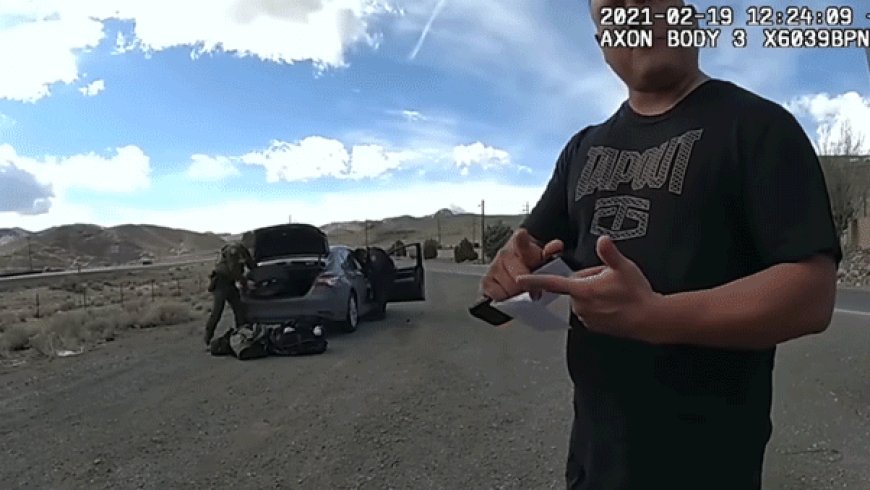‘This is personal’: Marine veteran reacts to judgment on federal loophole police used to seize his cash
A judge ruled Nevada Highway Patrol overstepped its legal authority when it seized nearly $90,000 from a Marine Corps veteran and handed the case over to the DEA.

A Nevada judge ruled that state police can't use a federal loophole to seize people's property, as highway patrol did when officers seized a Marine Corps veteran's life savings.
"The fight is not over," plaintiff Stephen Lara told Fox News Digital. "You have a lot of other people out there that are continuing to go through this unfortunate civil asset forfeiture process. Stories that we're not even hearing about in other states."
Lara's story began in February 2021 when he was driving from Texas to California to visit his daughters. He had about an hour left in his journey when an officer with the Nevada Highway Patrol pulled him over, accusing Lara of following a semi-truck too closely and driving under the speed limit, body camera video shows.
The officer asked Lara to get out of his car and casually asked him about his shirt, his daughters and, finally, whether he had any "large amounts of United States currency in the vehicle," video shows.
Lara said he was traveling with cash.
"I don’t trust banks, so I keep my own money," he said. He let officers search his car, where they found $87,000 in a plastic bag, along with bank receipts and paystubs.
Officers had a dog sniff the money and told Lara that the dog "alerted" to the money, suggesting it was tied to drugs. They seized his money and handed it over to the Drug Enforcement Administration (DEA) using civil asset forfeiture, which allows the government to seize and keep property it alleges is connected to criminal activity, even if police don't arrest anyone.
Lara was never charged with a crime.
The DEA lauds forfeiture as a means to "attack the financial structure of drug trafficking and money laundering groups worldwide, from the lowly courier carrying cash or drugs to the top levels of drug cartels."
Nevada is one of many states with limitations on civil forfeiture, requiring clear and convincing evidence that property is connected to a crime for it to be forfeited to the government.
But a program called "equitable sharing" allows state and local law enforcement to partner with federal agencies on forfeitures and sidestep restrictions. After federal officials seize the property, they can return up to 80% of the proceeds to the state agency.
"That being incentivized so that that department or that agency can gain assets or gain more revenue, to me, that's dirty," Lara said. "That's absolutely disgusting."
A NIGHTMARE BEFORE CHRISTMAS: HOW A MARINE MOM FOUND HERSELF FALSELY IMPRISONED FOR THE HOLIDAY
With the help of the Institute for Justice, a nonprofit civil liberties law firm, Lara eventually got his money back, but he has continued to sue for damages and to stop police from being able to take other peoples' cash.
Nevada Second Judicial District Judge Connie J. Steinheimer ruled last week that the state legislature has "not explicitly permitted NHP to utilize the federal process for forfeiture — which has less rigorous standards."
"NHP cannot undermine this bedrock policy and effectively circumvent Nevada’s civil asset forfeiture statutes by electing to participate in the federal equitable sharing program," Steinheimer wrote.
A spokesperson for NHP did not respond to a request for comment. The Institute for Justice expects the state to push back on the ruling.
Lara said he believes there won't be real change "until qualified immunity goes away." That's the doctrine that often shields police and other government agencies from being sued for violating people's rights.
"Taxpayers are paying these lawsuits," Lara said. "There's no accountability. And until these officers and until these departments are penalized directly … there's not going to be any incentive to stop."
A NIGHTMARE BEFORE CHRISTMAS: HOW A MARINE MOM FOUND HERSELF FALSELY IMPRISONED FOR THE HOLIDAY
And while Lara emphasized that his status as a veteran doesn't make him any more important than others who have had their money seized, his service has given him a unique perspective on the issue.
"This is personal to me," he said. "It does something to you when you have a country that pays you a retirement check for the service you put in, and it's that same country that's working in collusion with these local state police departments to try to take the very money that they pay you for retirement."


























































